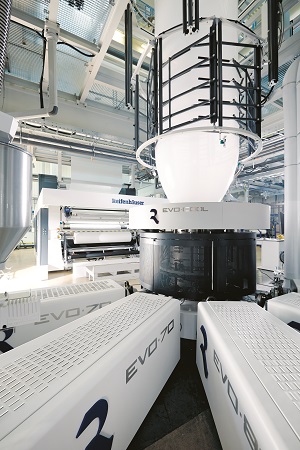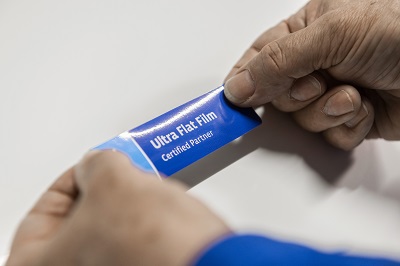The flatness properties of blown film play a crucial part in its processing performance. Things become particularly difficult if a film – made from polyethylene (PE), for example – is meant to be fused with another substrate. In conventional manufacturing processes, typical sagging and flatness defects can be expected as a result of the necessary lamination.
This is where Reifenhäuser’s EVO Ultra Flat haul-off, available since 2016, provides a remedy. The haul-off system enables the manufacture of significantly flatter films, as the film is stretched and smoothed when its residual heat is still above 50°C. This produces outstanding, energy-efficient flatness results that make secondary processing easier. Flatter films achieve higher finishing speeds, require less adhesive in the lamination process, and reduce the edge trimming through improved curvature. The resources saved not only increase economic efficiency, but also contribute to sustainability.
EVO Ultra Flat improves the flatness of laminating and barrier films by up to 40% and reduces sagging by up to 90%. How does Reifenhäuser know that? Because the film's performance can now at last be measured by a new laser measuring system. The measuring unit precisely records the topography of the fine film web in order to then set the optimum production parameters. "Until now, each film manufacturer had to rely on the experience and precision of its own production technicians. By developing the laser measurement system, we can offer our customers more process reliability regardless of the operator. The optimisation to pre-set parameters happens automatically in a closed control loop," explained Eugen Friedel, Sales Director at Reifenhäuser Blown Film.
The film topography that is fine-tuned with laser accuracy represents a new quality level and enables manufacturers to gain a decisive competitive edge as a result.
Ultra-thin but with optimum strength
Environmentally friendly, bio-based plastics are a possible approach to using plastic in a more sustainable way. By definition, they must be biodegradable. Some are even made from renewable resources such as sugar cane or corn. There is significant potential for the use of bioplastics, particularly in the packaging sector with a comparatively short service life, such as transport packaging for food or takeaway products.
However, due to its different material composition, a few challenges in manufacturing biodegradable packaging film have emerged, which have been inhibiting market growth – above all, the material costs. Bioplastics are approximately four times as expensive as PE. In addition, concessions in terms of mechanical properties have to be made with conventional processing methods. The material's lack of stiffness means that the finishing process is longer, for example when manufacturing compostable bioplastic bags.
"We believe in the future viability of bioplastics as a real alternative in the circular economy. This is why we have developed Ultra Flat Plus: a solution for our customers that increases economic efficiency and significantly improves processing properties," explained Marcel Perrevort, Sales Director at Reifenhäuser Blown Film Polyrema.
Reifenhäuser is currently the only company offering this technology. Using the unique inline stretching unit on the haul-off, a 30% thinner film is achieved. Down-gauging the still-warm bio-film increases its strength, meaning that the finishing speed also increases – to a level comparable with that of PE films.

Ultra Flat Plus
Stretching the film with Ultra Flat Plus haul-off is more energy efficient, saving users or customers additional resources. "This small upgrade enables high-quality bio-blown films and bio-winding films to be produced with a simple mono-layer line. The tool's control system is very quickly and intuitively integrated into existing processes," stated Marcel Perrevort.
But what makes EVO Ultra Flat so special? The secret of the new optimised film flattening system is mainly its position within the process. While in the past flattening systems were arranged just in front of the winder, EVO Ultra Flat is installed exactly at the point where optimum processing conditions are available for flattening the web, that means upstream between the haul-off nip roll assembly and turner bar system. This arrangement offers the following advantages: At this stage of the process the film has still a temperature of over 50°C and is thus not fully crystallised. Stretching of the film is not only much easier while it is still flexible, but also more energy efficient than all other commonly available systems used at the end of the process.
Further benefits are low investment costs and high functionality and flexibility: Four heating-cooling rolls and two nip rolls designed for independent speed and temperature control allow producers to obtain the desired flattening effect. In this way, it is possible to obtain optimum results with different raw materials and film thicknesses. In addition, sagging of the web can be reduced by a targeted control of the rolls.
Sustainable production in focus
Reifenhäuser will be presenting new ways of producing plastic sustainably at K 2019 in October. In doing so, the 'Extrusioneers' are far exceeding the standard portfolio for a machinery manufacturer. When developing its products, Reifenhäuser thinks about recyclability from the very outset, for example through efficient processes that go easy on resources and reduce the use of plastic, machines that produce without generating waste, and innovative solutions for recycling plastic waste. "Our comprehensive knowledge base within the Reifenhäuser Group enables us to provide a wide range of solutions that meet the requirements of sustainability and competitiveness. All of the technologies that we are showcasing at K 2019 are based on the four following principles: reduce, reuse, recycle, and replace," explained Ulrich Reifenhäuser, Chief Sales Officer.. "As plastic was the material of the last century and retains its dominance in this century, we, as a part of the plastics industry, have a dominating task to perform, namely: to solve the problem of recyclability."

EVO Ultra Flat improves the flatness of films by up to 40% and reduces sagging by up to 90%.
The family-run company from Troisdorf has strategically focused its business on three areas: extrusion lines, components, and digital solutions. Structured as a network of highly specialised business units, Reifenhäuser connects its expertise from all areas of the business and is therefore well placed to drive forward developments and innovations.
Air Jordan V 5 Shoes













